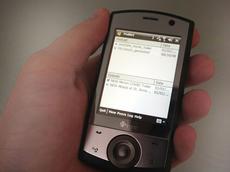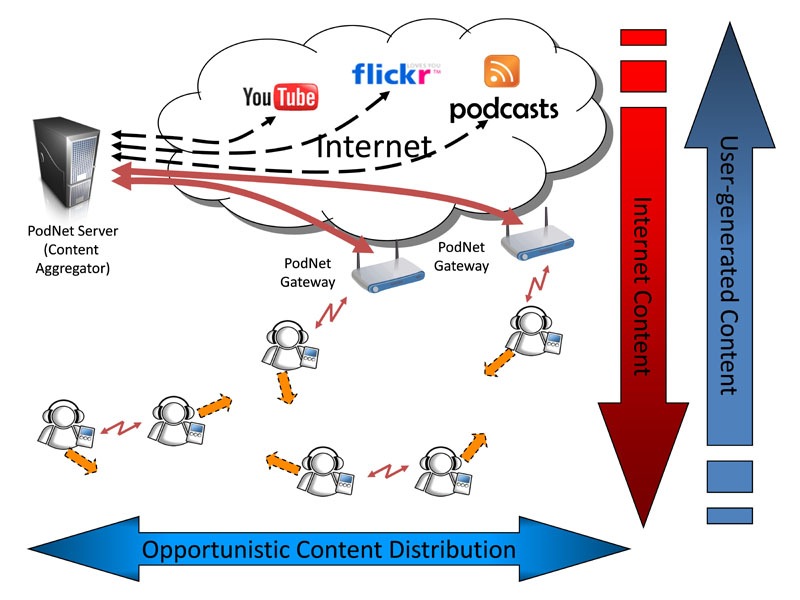Podcasts on the move
So you missed the last episode of Giacobbo/Müller and do not have any access to the Internet right now to download the latest podcast? Thanks to PodNet, developed by researchers from ETH Zurich, this problem could soon be dealt with “in passing”. Dr. Martin May, Dr. Vincent Lenders and Dr. Franck Legendre from the Institute of Computer Engineering and Networks Laboratory (TIK) are working on a PodNet that cellphone owners can use as an exchange platform for podcasts via WLAN.

The idea behind the platform: members can select the information they are interested in and the latest podcasts they would like to have on their cellphones. This could be BBC News or SF News, but also the current closing and opening lectures at ETH Zurich. Your own cellphone then periodically looks for someone in the vicinity who already has the podcast in question on his or her cellphone and automatically loads it onto yours via WLAN.
Be your own program boss
Of course if you have a cellphone with Internet access, you can already download such public podcasts whenever you want - even without PodNet. The application possibilities of the PodNet, however, are much more varied and above all geared towards the requirements of the Web 2.0 generation. Platforms where only external products are exchanged are no longer in fashion. Formats like Facebook or Youtube, where individual pieces can be uploaded, on the other hand have become extremely popular. PodNet also allows to integrate these formats in its framework. Users can generate their own broadcast on their cellphones and present their own content. Theoretically, setting up your own “transmitting station” could also be conceivable. However, the variety of application possibilities also harbors legal complications. “Our project currently has a prototype status and there are many aspects, both technically and legally speaking, that still need to be clarified more precisely”, May stresses. For example, nobody wants spam to be circulated via PodNet. However, despite such misgivings, May is convinced that there is a demand for a platform like PodNet. “Big telecommunications corporations are also interested in this kind of system because they can use them, for example, to offer customers the opportunity to exchange Facebook data”, explains Lenders.
Stability test during EURO 08
A big event like EURO 08, where there are many opportunities to make interesting films on your cellphone, is ideal for a test. That is why members of the institute are testing the stability of the software throughout the tournament. If this long-term test proves successful, the researchers are planning to expand the PodNet to include the whole of ETH Zurich. Then, anyone who owns a modern cellphone with a WLAN option can participate. PodNet users will have to declare themselves willing to make any podcasts they download from other participants available again. This is aimed at excluding people who only “collect”. In addition to the exchange from cellphone to cellphone, stationary gateways are planned at ETH Zurich that distribute new content, collect the data from cellphones and pass it on. However, before this expansion can come about, certain details in the system need to be improved. As Legendre explains, the design of the User Interface, for example, needs to be more user-friendly.
Insights into social networks
The ultimate aim of the PodNet project for the ETH Zurich researchers is not the development and technical implementation of the software; they are far more interested in the insights into the social network a platform like PodNet would provide. So far, there have only been tests on communications networks comprising around 100 people, which were carried out a few years ago at MIT. Legendre emphasizes that expanding the project to ETH Zurich could mean gaining 1000 participants. For the first time, this would provide evidence as to how cellphones and content “move”. The focus of the Zurich-based researchers would be the contacts between the cellphones. They would be able to draw conclusions concerning the exchange of data, how often individual cellphones meet, for how long and above all how much time elapses between contacts. This information would be collected by the stationary gateways. It should be pointed out that the contacts are not personalized, meaning that the researchers do not have any insight into the identities of the people involved. “We are not interested in following the whereabouts of individuals”, stresses Legendre. “It is information on the communication networks as a whole that we are looking for.” The results of the study should help adjust algorithms to the needs of the users and thus improve the functionality of communication networks. The three researchers agree that PodNet will not purely be a platform or application. “PodNet constitutes a new research direction that combines many research areas,” explains May. “For example, we use models from the field of complex networks or graph theory to analyze the structure of the social networks.”








READER COMMENTS